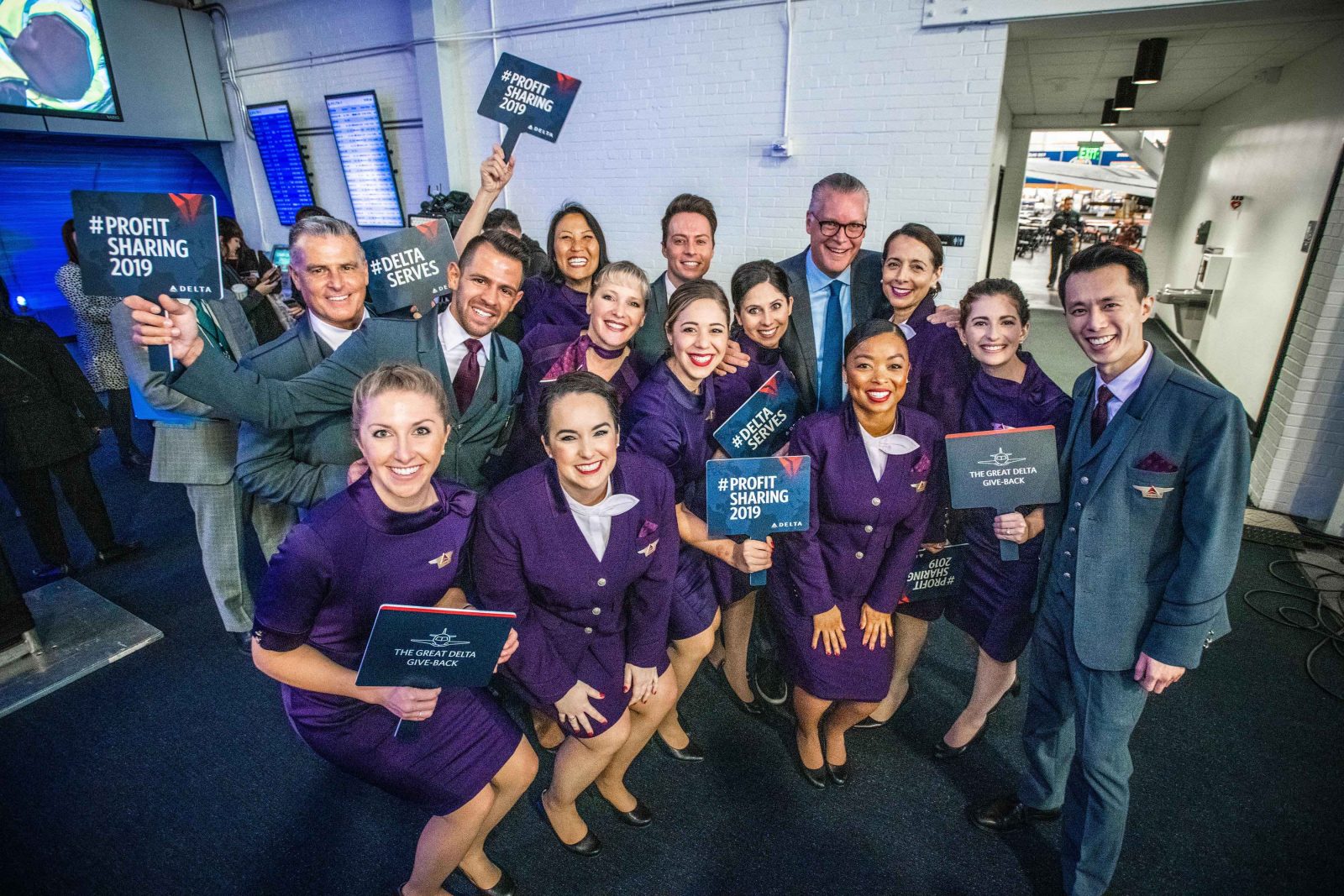
As profit sharing bonuses go, Delta Air Lines once again stormed ahead of the pack, surpassing every other major U.S.-based airline in its generosity for a good job well done. The Atlanta-based airline recently announced it would pay out $1.3 billion in profit sharing bonuses in 2019 – that’s the second biggest in Delta’s history and for most of the airline’s employees, including flight attendants, that represents a massive 14% of their annual salary.
Delta’s chief executive, Ed Bastian says such generous bonuses “have always been a part of our culture,” explaining that profit sharing is a way of rewarding “outstanding results” that his employees have delivered in “unmatched reliability and customer service.”
In comparison, United’s profit-sharing pot was just $334 million and Dallas-based American Airlines shared a measly $175 million with its employees – just 1.4% of its annual profits. American’s chief executive, Doug Parker was even called out over alleged comments he made deriding profit sharing, saying “it’s just not right to pay 100,000 employees that don’t have that much impact on daily profits”.
But critics say Delta is taking its employees for fools. The International Association of Machinists and Aerospace Workers or IAM for short, claims Delta’s flight attendants are the most productive in the U.S. aviation industry yet aren’t “being fairly compensated for working the hardest.”
 They say that while Delta’s profits have steadily improved since 2013, pay and conditions for frontline Delta employees have failed to keep up and are in fact lagging behind the average wages of their peers at United, American and even Southwest. The average Delta flight attendant is said to earn around $58,000 per year while their counterparts at American take home $4,000 more.
They say that while Delta’s profits have steadily improved since 2013, pay and conditions for frontline Delta employees have failed to keep up and are in fact lagging behind the average wages of their peers at United, American and even Southwest. The average Delta flight attendant is said to earn around $58,000 per year while their counterparts at American take home $4,000 more.
Yet Delta flight attendants are said to be working harder than their peers.
“Not only are we providing the best service in the airline industry, but we are doing it with fewer flight attendants than our peer group. Management’s strategy is to squeeze every bit out of us to maintain their competitive edge,” says Elisabeth Joyce, who’s a serving Delta flight attendant.
Joyce is a member of IAM and is fighting for Delta flight attendants to vote in favor of union representation. At present, the airline is one of only a few in the U.S. to have a non-unionized flight attendant workforce – that allows it to be nimble and work directly with employees.
But IAM says its a situation that also allows Delta to take advantage of flight attendants. Without a contract, IAM claims flight attendants can find their working conditions changed at the whim of the airline, wages can go up when the airline is performing well but increasing costs, say from rising fuel costs, could also see Delta squeeze wages to make up for lost profit.
But here’s the thing – maybe being the best-paid flight attendants in the United States isn’t the only consideration for many of Delta’s cabin crew. The highest wages in the industry doesn’t necessarily make for the best culture, the most enjoyment or job satisfaction.
Just look at American’s flight attendants – they may well be the biggest earners of all U.S.-based flight attendants but morale is at rock bottom and contract negotiations are set to be painful and protracted.
Delta, meanwhile, continues to win a raft of awards for creating an environment where people enjoy coming to work. Only this month, Delta was named one of Fortune’s Top 100 Best Companies to Work For and in September the airline was named a Great Place to Work, with 90% of respondents saying Delta is overall a great place to work and 93% saying they were proud to work for the airline.
The situation is similar at Delta’s major joint venture partner Virgin Atlantic – there, cabin crew see little career progression and wages don’t keep up with that of their peers and yet turnover remains low. That’s because cabin crew think other factors, including culture and job satisfaction, are just as important as their pay.
Could fighting for a union-negotiated contract benefit Delta flight attendants? Yes, absolutely. But that doesn’t necessarily make it the right solution.
Related
Mateusz Maszczynski honed his skills as an international flight attendant at the most prominent airline in the Middle East and has been flying ever since... most recently for a well known European airline. Matt is passionate about the aviation industry and has become an expert in passenger experience and human-centric stories. Always keeping an ear close to the ground, Matt's industry insights, analysis and news coverage is frequently relied upon by some of the biggest names in journalism.







